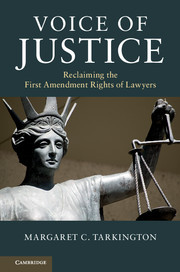Description
Voice of Justice
Reclaiming the First Amendment Rights of Lawyers
Author: Tarkington Margaret
This book shows that securing attorney First Amendment rights protects the justice system by safeguarding client interests and checking government power.
Language: English
Subject for Voice of Justice:
Approximative price 31.58 €
In Print (Delivery period: 14 days).
Add to cart
Voice of Justice
Publication date: 09-2018
294 p. · 15.2x22.8 cm · Paperback
Publication date: 09-2018
294 p. · 15.2x22.8 cm · Paperback
Approximative price 75.15 €
In Print (Delivery period: 14 days).
Add to cart
Voice of Justice
Publication date: 09-2018
294 p. · 15.7x23.6 cm · Hardback
Publication date: 09-2018
294 p. · 15.7x23.6 cm · Hardback
Description
/li>Contents
/li>Biography
/li>
The First Amendment rights of lawyers are ethereal. Most lawyers fail to realize that courts may deny them access to the First Amendment's protective shield in many regulatory and disciplinary contexts. Overall, attorneys cannot and should not assume that they can obtain First Amendment protection - especially when acting as an attorney in their role as an 'officer of the court'. Yet, it is precisely in the lawyering context - where attorneys engage in speech, association, and petitioning for the very purpose of securing client rights, invoking law, enabling the judicial power, and obtaining justice - that the need for First Amendment protection is the most acute. If regulators silence that voice, they silence justice. From overarching theory to specific real-world contexts, this illuminating book provides a critical resource for lawyers, judges, and scholars to understand the relationship between the First Amendment rights of lawyers and the integrity of the justice system.
Introduction; Part I. Understanding The Puzzle: 1. Do lawyers have First Amendment rights?; 2. 'Speech is all we have'; 3. Self-regulation: myth and reality; 4. Attorneys as officers of the court and delegates of state power; Part II. Towards A Proper Methodology: 5. Core ideals of the First Amendment; 6. Cognate inseparable rights; 7. The access to justice theory; Part III. Protecting The Role Of The Attorney: 8. Freedom to form an attorney-client relationship; 9. Safeguarding client counseling and confidences; 10. Invoking law and processes to protect client interests; 11. Safeguarding and impugning judicial integrity; 12. Securing criminal constitutional processes; 13. Uncompromised pretrial publicity; 14. Attorney civility, harassment, and discrimination.
Margaret Tarkington is a Professor of Law at the Indiana University McKinney School of Law. Her scholarship bridges specialties in constitutional law, lawyer regulation, and procedure – harnessing the First Amendment as a means to protect the integrity of government processes. In addition to teaching and writing on these topics, she has served as an expert consultant on disciplinary proceedings brought against attorneys for their speech, association, and petitioning. She serves as the 2018 Chair of the Association of American Law Schools (AALS) Professional Responsibility Section. She previously practiced law in New York, Indiana, and Utah.
© 2024 LAVOISIER S.A.S.




